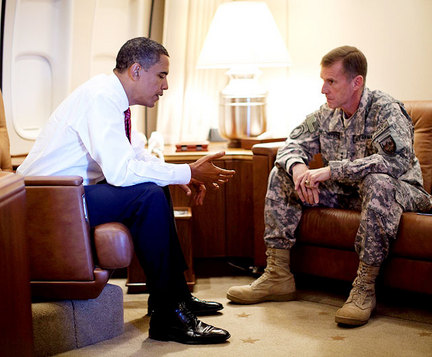
Obama and his general — he doesn't look "uncomfortable and intimidated." Source: www.media.syracuse.com
Insubordination by top military officers to civilian authority is unacceptable in America. As presidential biographer Robert Dallek argued in today’s NYTimes, McChrystal’s defiance of his civilian masters may warrant dismissal. However, there is another important issue here: how hubris on the campaign trail can lead to sub-par policy choices.
President Obama’s decision early in his administration to withdraw US forces from Iraq and build them up in Afghanistan came right out of the commitments he made on the campaign trail. Obama’s meteoric rise owed a lot to his charisma and natural talents, but also to his successful argument before the American people, embraced by almost all Democrats, that Bush was a buffoon and his policies failed ones. Obama savaged W on the campaign trail like no other candidate. On foreign policy, he argued that Bush had taken his eye off Al Qaeda and the Taliban when he irresponsibly invaded Iraq. As a result, as president, Obama had little choice but to wade into a war in a country that bled the British and Russians into second-rate powers and is now going badly wrong and causing dissension within NATO.
This is what happens when foreign policy is written by political hacks. Orchestrated by bare-knuckles political operative David Axelrod, Obama’s take-no-prisoners 2008 presidential campaign was much like the Rovian strategy criticized by Democrats. Whatever Bush did was bad; the opposite was thoughtful and insightful. Notwithstanding his Kennedyesque image, Obama has not been a practitioner of bipartisanship, of new politics, of change we can believe in. He, like the Kennedys, is an aggressive partisan out to demolish opponents.
I am not going to re-open the debate about whether or not Iraq should have been invaded. I believe there are reasonable arguments for and against. But, the left in this country tends to characterize anyone that supported the ouster of Saddam Hussein in 2003 — on legal, moral and strategic grounds — as virtually a war criminal. W is unfairly pilloried as such. There is even a play out now putting W up against a war crimes tribunal.
In November 2008, I supported Barack Obama for president, somewhat belatedly and reluctantly, because I felt he was the better of two sub-par choices (see my blog on the matter). But I have always seen his hubris as his Achilles’ heel. Here was this guy with virtually no foreign policy experience (not even serious academic study of American Foreign Policy) claiming he was the best choice to run the single superpower’s foreign affairs. More recently, I wrote, “Barack Obama made the point last year on the campaign trail that, unlike Hillary Clinton, he has good judgment, never supporting an invasion of Iraq, even making a speech to that effect in the Illinois state legislature, where grandstanding on the issue had no policy effect at all. Putting aside whether we should have invaded Iraq to rid the world of this dictator with bad intentions if not bad weapons, it is a legitimate debate whether we should wind down Iraq, a country central to stability in the Middle East — given its location, ethnicity, and oil wealth, and wind up Afghanistan, arguably a mountainous backwater that has bled imperialists from Russia to Britain to the United States for centuries. True, instability in Afghanistan triggers instability in nuclear-armed Pakistan. I said there were good points on both sides of the issue. I merely wish to get under the teflon a little and question the wisdom of President Obama’s foreign policy choices.”
Now that policy shift is going badly wrong — with the mission failing in Afghanistan and the inconclusive Iraqi elections leaving partisans poised to take up arms, just as US troops are boarding transports out.
Hubris prevailed when Obama, driven to surpass his predecessors by passing health care reform, left foreign policy priorities floundering for months. This was reportedly one of McChrystal’s frustrations. The McChrystal Affair underscores the disarray not only in the president’s “Af-Pak” group, but also in the broader foreign policy team. Some of the personalities on the president’s team leave something to be desired — notably, Holbrooke and Biden, the former with more conceit than the Commander-in-Chief, the latter a shallow extrovert. I have long argued that Obama should bring in some experienced hands like Nick Burns, the boyish career foreign service officer who served both Democratic and Republican presidents and was recently Sec. of State Rice’s number three.
The warning I and others gave about Obama, that rhetoric and inspiring speeches alone cannot govern, is relevant to the McChrystal Affair. At issue is the age-old dichotomy between good government and good politics. President Obama has proven himself a masterful politician – recasting his failures as Republican ones, snatching political victories from the jaws of defeat, as he did with health care reform. Obama could even turn the McChrystal Affair into good politics. He and his Reaganesque image-makers can make the Afghanistan policy look like his Bay of Pigs. That is, a young president with good intentions is misled by his generals to undertake a failed foreign adventure. Then, this rightly angry president fires the general in charge, apologizes to the American public on television, becoming the latter’s darling again, and alters the policy course. Good politics, but good government is trickier.
Ironically, the man most responsible for Obama’s rise, that is, W, was also a success at politics (i.e. two terms), but fell short at government. Good government requires experience and advisers other than David Axelrod and Karl Rove. My optimistic belief is that ultimately good government wins elections. Bring Nick Burns, and others like him, back…